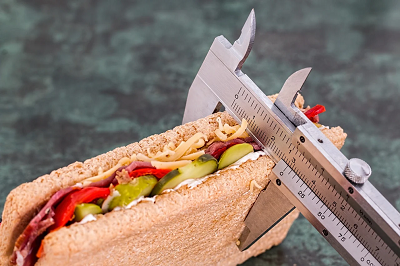
Have you been struggling with your weight? You’re not alone. In fact, millions of adult Australians struggle with their weight. You’ve probably even been to a doctor or seen a personal trainer who tells you it’s a simple matter of ‘calories in versus calories out’ or espouses the benefits of a ‘caloric deficit’. The question is: If weight loss were a simple matter of achieving a caloric deficit, why do so many of us still struggle with our weight?
What is a caloric deficit?
A caloric deficit is achieved when you consume fewer calories than your body expends. That is, fewer calories into your body than out of your body. Sounds simple, right? The unfortunate reality is, nothing could be further from the truth. For starters, determining exactly how many calories your body expends is almost impossible. This ‘simple equation’ and those who tend to promote it as an effective weight loss strategy, often tend to group people into arbitrary categories and do a lot of guesswork around how many calories you may need. Needless to say, this guesswork is inaccurate and makes the whole caloric deficit idea far less than perfect. However, where this theory of caloric deficit really comes up against some trouble is when it is assumed that eating less than your body burns is 1) good for you and 2) a simple matter of willpower. In this article, we will further break down why the latest and greatest in weight loss lingo isn’t the silver bullet for weight loss that it’s made out to be.
Counting calories can be seriously harmful
Whether or not you struggle with your weight, counting calories can be a seriously harmful habit to get into. Disordered eating is an all-too-common result of fastidious calorie counting, and despite popular belief, does not only affect those suffering from or prone to anorexia and bulimia. Disordered eating includes any problematic eating behaviour, including restricting oneself from food, binge eating, purging, the use of diet pills or laxatives, and a whole range of emotional issues associated with negative self-worth and self-image, obsession with weight, unrealistic ideas about one’s own body, and more. The counting of calories can result in calorie counting obsession and disordered eating, an unhealthy relationship with food (e.g. food is the enemy), and for anyone prone to negative self-image or full-blown eating disorders, calorie counting can be triggering and ultimately extremely harmful.
Caloric deficit ignores the deeper issues
Have you thought about why you find it hard to lose weight? Maybe you’ve been told time and again that it’s just a matter of willpower. Which suggest that, if you’re struggling, it must be because you’re unmotivated or lazy. For many people struggling with their weight, this is not at all the case. However, there are more likely some deeper, underlying issues surrounding your relationship with your body, with food, and with your self-worth. Only by uncovering these issues and addressing them both consciously and subconsciously can you expect to make a real and lasting change.
At Integrated Health Specialists, our weight loss programs are designed to be holistic and tailored to overcome your individual hurdles. Unlike a simple caloric deficit diet or basic exercise plan, we address not only your eating and exercising habits, but your emotional and mental state, your deeply ingrained beliefs and behaviours, and your own individual metabolic needs.
Eating fewer calories than your body needs is a bad idea
Another problem with the caloric deficit theory is that it assumes that eating fewer calories than your body expends is a cure-all for those struggling with weight when, in fact, it can have the opposite to the desired effect. Eating fewer calories than your body needs to function can initially result in a small spurt of weight loss. However, over time, this eating style can slow down your metabolism, doing irreparable harm, and resulting in weight gain and difficulty with weight control for years to come. When it comes to weight loss, maintaining a healthy relationship with food, and giving your body the fuel it needs, are incredibly important for long-term success.
So, what’s the alternative?
The real answer to weight loss is not one-dimensional. In order to improve your health and wellbeing, and succeed with weight loss in the long term, a whole-body-and-mind solution is needed. That’s why we’ve developed our range of weight loss programs to incorporate nutritional psychology, naturopathy, diet and exercise (including personal training), and the support of an experienced psychologist. Here are just a few of the extensive, holistic weight loss programs we’ve developed, which have helped hundreds of our clients to succeed with their weight loss goals:
Kick Start Weight Loss Program: This 2-month program is designed for those who want to set some solid foundations for weight loss. You’ll receive education on the most up-to-date diet and exercise science, and have the support of a personal fitness coach, hypnotherapist, and psychologist to support you through your weight loss journey.
Holistic Wellness Program: This program will change the way you approach health altogether, in a 4-month intensive overhaul. With access to a personal health and fitness coach, psychologist, and naturopath, you’ll experience the most effective therapies for weight loss. These include hypnotherapy, Neuro Linguistic Programming (NLP), Emotional Freedom Techniques (EFT), Bio-Impedance Analysis Assessments and Nutrigenomics (DNA Testing).
Weight Loss Hypnotherapy Programs: These include personalised behaviour modification programs consisting of 3 hypnotherapy sessions and other effective mind-repatterning techniques (including EFT and NLP) to change the deep-seated beliefs and behaviours affecting your ability to maintain your optimal health, fitness and weight. These sessions include a personal hypnotherapy CD to take home and continue to strengthen your health and fitness and achieve your weight loss goals.
To find out more about these and our other weight loss programs, visit our Weight Loss Programs page. Or, get in touch with us today and begin your journey to weight loss and the healthy lifestyle you’ve been searching for.
